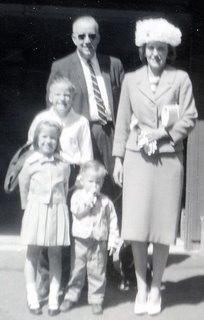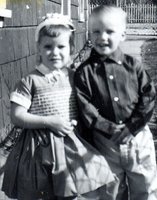 If you are a baby boomer, like I am, then you probably have many fond memories associated with dressing up in your finest attire (hopefully, new clothes) for Easter Day. I know that I do.
If you are a baby boomer, like I am, then you probably have many fond memories associated with dressing up in your finest attire (hopefully, new clothes) for Easter Day. I know that I do.On of my favorite Easter Day pictures is the one to the left. The picture is of my mother, father, older brother, younger sister and younger brother just before going to church on Easter Day. I was taking the picture.
You might be wondering why it's one of my favorites. Well, just look at my older brother's smile - or grimace might be a better description.
And, then, of course there's my mother's hat. It was this big, white, floral, lace, ribbon concoction. Oh, sorry, mom. I meant hat. It was lovely... WINK! WINK!
Every time I look at this picture and my mother's hat I can't help but think about the words from Irving Berlin's 1948 song "Easter Parade."
"In your Easter bonnet, with all the frills upon it
You'll be the grandest gal in the Easter parade.
I'll be all in Glover, and when they look us over
We'll be the proudest couple in the Easter parade."
If you're a reader of my Linda's Blog then you know that I just love historical traditions. So, of course this got me to thinking about the tradition of Easter clothes and the Easter parade. Where and when did this all begin? Where did the wearing of new clothes come from?
Early Christians believed the week before Easter was a good time to be baptized and called it "White Week." They dressed in new white robes, which they wore during the entire Easter week to symbolize their rebirth and new life. People who had been baptized previously wore new clothes on Easter to symbolize they shared in this rebirth and new life.
Subsequently, Europeans came to believe that a new piece of clothing on Easter Sunday would bring good luck. Old or used garments would bring a year of misfortune. So new clothes became a symbol of Easter. It's unbelievable how many traditions we still have based upon superstition.
It wasn't until the Middle Ages that people in their new clothes began to take walks after their Easter service. This eventually evolved into the tradition of Easter Parades, of which New York's 5Th Avenue is probably the most famous.
After the Civil War Easter was known as the "Sunday of Joy." Women and girls who had worn dark colors of mourning during the war decided to start wearing the bright and wonderful colors of spring. Their hats were decorated with fresh flowers. If the fresh flowers weren't available then they would make flowers out of paper, fabric, ribbons, feathers, hairs, etc.
The Easter Parade in New York began in 1860 - the Victorian Era, of course. The elite of society would attend Easter Service at one of the churches along 5Th Avenue and then parade down 5Th Avenue afterwards to give every one a chance to view their new Easter hats and dresses. I would have loved to have seen that. Some of the dresses had to be absolutely gorgeous. And, of course, there were the hats.
The hats were elaborate and kept getting bigger and bigger and bigger with each passing year. Flowers, lace, bird's nests (that's something I definitely want in my hat), ribbons, etc. were all used to decorate the hats. The more elaborately decorated the hat, the better.
Of course, the first Easter bonnets were worn way before Easter was even celebrated. They weren't even bonnets at all. They were circles of wreaths of leaves and flowers and were worn atop the head to celebrate Spring. The round shape symbolized the sun and the life cycle.
In essence the Easter Parade along 5Th Avenue was the forerunner of what is known today as a "fashion show." Many seamstresses would bring their sketch pads with them to the Easter Parade so that they could go back and create knockoffs for their less wealthy clients.
Even as a child I loved Easter. Why?
 For me it had to do with my fascination for beautiful dresses. My mother would buy me the most beautiful little girl's dress for Easter. I'd have my hat or bonnet (of course), my black patent leather shoes, white lace socks (the tops had to be lace, of course), my white gloves (oh, yes I wore gloves), and my little purse. I don't remember what I carried in that purse. What possible needs did a little girl have. Maybe I kept my candy in there. In any event, as you can imagine I loved it.
For me it had to do with my fascination for beautiful dresses. My mother would buy me the most beautiful little girl's dress for Easter. I'd have my hat or bonnet (of course), my black patent leather shoes, white lace socks (the tops had to be lace, of course), my white gloves (oh, yes I wore gloves), and my little purse. I don't remember what I carried in that purse. What possible needs did a little girl have. Maybe I kept my candy in there. In any event, as you can imagine I loved it.The picture to the right is of my older brother and I on Easter Sunday. Just look at my dress. I actually remember that dress. The front bodice had the most beautiful smocking and there were several layers of tulle underneath to keep the skirt puffed out. If you've never worn a dress with tulle you can't imagine how itchy it was. If you look closely my hat was a headband adorned with flowers and I think I was carrying a lollipop. Maybe that's what I kept in my purse. My brother, of course, was all decked out in his finest too. We probably walked around our house for our Easter Parade.
Another fond memory I have of Easter attire is the first year I wore high heels. What a disaster that was. I never got the hand of it and still don't know how women wear them. I kept falling off the side of the high heels. For me, given that I'm a tall women, that was comical to say the least. So flats or shoes with wide heels became my shoes of choice.
As with many wonderful traditions, new Easter outfits are a thing of the past. Some people do buy new clothes and some places have Easter parades as a lark. For me, I will always have the fond memories of my beautiful Easter dresses, and then there's my mothers hat. That hat! She could have had an eagles nest in it. Just kidding, Mom. It was lovely... WINK! WINK!

Your website is outstanding! Here is the url to the blog from the Archives of the Sandusky Library, if you would like to take a look:
ReplyDeletehttp://sanduskyhistory.blogspot.com